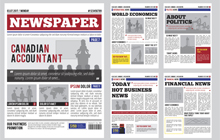Friday News Roundup 20.12.18: CERB turmoil, tax gaps and havens, and more

Wrapping up the odds and ends in this week’s Canadian accounting news
TORONTO, Dec. 18, 2020 – There were so many odds and ends this week in the world of Canadian accounting that we should stop wasting space and get right to it:
More CERB repayment turmoil …
Not a day goes by without some sad sack story about the Canada Revenue Agency trying to recover money from the recipients of the Canada Emergency Response Benefit. Take the whole issue of self-employed applicants and CERB eligibility through net income. As the Toronto Star reports, people are accusing CRA agents of giving incorrect eligibility information, and the accusations seem reinforced by missing CRA webpages, as reported by the Huffington Post.
Meanwhile, tax pundit Allan Lanthier, writing in the Financial Post (he’s also written for Canadian Accountant), says “It is time for the government to collect what it can, lick its wounds and move on,” because the government doesn’t have a hope in h-e-double-hockey-sticks of ever collecting the money it gave out by mistake.
Mind the tax gap reports
This week, the Canada Revenue Agency published two new reports in its tax gap series, on tobacco duties and sales tax payments respectively. Hard to believe that Canada is losing about a half-billion dollars a year in taxes due largely to cigarette smuggling, which must make the underground trade worth billions. As for the payment gap, CRA records show significant declines in the collection of GST/HST, going back to 2014.
That said, it’s a bit rich for the Minister of National Revenue to claim “Our government is delivering on its commitment to calculate the tax gap,” when it took years and the threat of legal action for Canada to finally capitulate on the publication of the tax gap, as many other countries have done for years.
More money to investigate money laundering
Speaking of the Feds, the RCMP will be getting $98.9 million over five years to modernize the RCMP and strengthen its ability to fight money laundering and identify proceeds of crime. The federal government is creating new teams, which will include forensic accountants, to be based in British Columbia, Alberta, Ontario and Quebec. It will be interesting to watch which sectors garner the attention of a beefed-up force that has been called toothless by retired officers.
CRA takes Sahota family to court
A Vancouver-based family infamous for its multi-million dollar portfolio of “low income housing” is being taken to court by the Canada Revenue Agency. As reported by the Globe and Mail, the Sahota family is facing a $1.2 million tax judgment “and the possible forced sale of the family home.”
When is a carbon tax not a tax?
When it’s before the Supreme Court of Canada. What most Canadians refer to as a tax is called an “adjustment,” a “mechanism,” or simply “carbon pricing,” and not only for “politically driven word play,” as the Globe and Mail states eloquently, but because it matters to the Constitution. Read more here.
The South Dakota tax haven
There’s a scene near the end of “The Laundromat,” the very uneven Netflix tragicomedy about Mossack Fonseca and the Panama Papers, where Antonio Banderas (playing Ramon Fonseca), addresses the audience: “So, if we are the losers, then who are the winners? The United States. The biggest tax haven in the world. Delaware. Nevada. Wyoming.” Apparently the list was missing South Dakota.
The Guardian published an excellent long read on Monday about South Dakota and the South Dakotan Trust. Among its takeaways was that the earnest work of the OECD on a Common Reporting Standard, the OECD framework signed onto by Canada, among other countries (but not the U.S.), has made tax haven states the beneficiaries of international wealth transfers from former tax havens around the world.
By Canadian Accountant staff.






(0) Comments